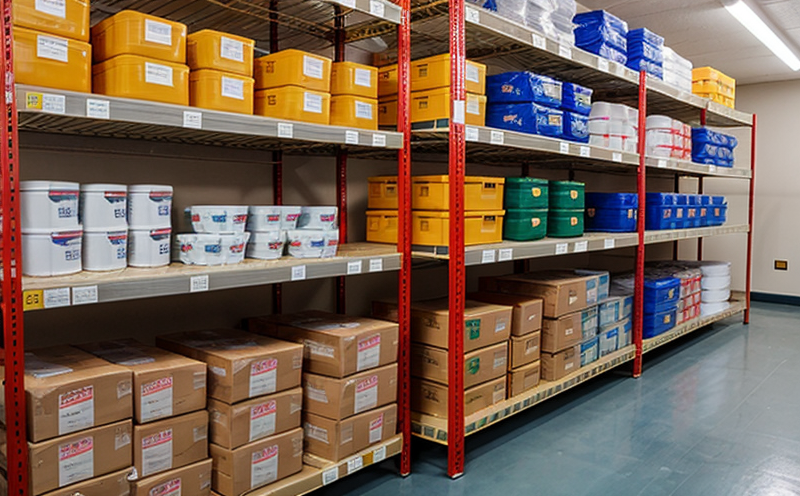API Oxidative Stability Testing
The pharmaceutical sector is highly regulated and requires stringent quality control measures to ensure that all products meet safety and efficacy standards. One critical aspect of this process is API oxidative stability testing. Active Pharmaceutical Ingredients (APIs) are susceptible to oxidative degradation, which can lead to product instability, reduced shelf life, and ultimately, ineffective medications.
Oxidative stability testing evaluates the resistance of APIs to oxidation under controlled conditions. This test helps determine how long a drug substance remains stable during storage or after formulation into a final dosage form. By conducting this type of analysis, pharmaceutical manufacturers can ensure that their products meet regulatory requirements and are safe for consumers.
At Eurolab, we offer comprehensive oxidative stability testing services tailored to the unique needs of the pharmaceutical industry. Our team uses state-of-the-art equipment and follows strict protocols based on international standards such as ICH Q1B, ISO 25036-4, and ASTM E2847. These guidelines provide a framework for evaluating the chemical and physical properties of APIs over time.
The testing process typically involves exposing API samples to various oxidative stressors like oxygen, light, heat, or moisture. The rate at which these conditions degrade the API is then measured using spectroscopic techniques such as UV-Vis spectrophotometry, GC (Gas Chromatography), and HPLC (High Performance Liquid Chromatography). These methods allow us to quantify changes in the chemical structure of the API over time.
The results from our oxidative stability tests provide valuable insights into potential issues that may arise during manufacturing or storage. For instance, if an API is found to be unstable under certain conditions, it might indicate a need for improved packaging materials or formulation adjustments to enhance shelf life. Additionally, this information can inform decisions about which excipients should be used in conjunction with the drug substance.
Our team of experienced scientists works closely with clients throughout the testing process, ensuring that all aspects are addressed according to best practices. From sample preparation through analysis and reporting, we strive for accuracy and reliability in our findings. This level of expertise ensures that pharmaceutical companies have access to reliable data they can trust when making important business decisions.
In summary, oxidative stability testing plays a crucial role in ensuring the quality and safety of APIs used in drug development. At Eurolab, we are committed to providing top-notch services that meet or exceed industry standards. Whether you're looking to validate new formulations or monitor existing products, our team is here to support your needs.
Benefits
- Enhances product quality: Ensures consistent performance and reliability of APIs over time.
- Avoids regulatory issues: Helps comply with stringent regulations governing pharmaceutical products globally.
- Promotes patient safety: Reduces risks associated with ineffective or harmful medications due to degradation during storage.
- Saves costs: Identifies necessary changes early in the development process, avoiding costly recalls later on.
By investing in oxidative stability testing, pharmaceutical companies can build confidence in their products while minimizing potential risks. This proactive approach not only supports compliance but also contributes to long-term success by fostering trust among consumers and healthcare providers.
Eurolab Advantages
- Expertise: Our team comprises highly qualified professionals with extensive experience in pharmaceutical testing.
- Comprehensive Solutions: We offer a wide range of services designed specifically for the pharmaceutical industry, including API oxidative stability testing.
- Innovative Equipment: Utilizing cutting-edge technology ensures accurate and precise results every time.
- Regulatory Compliance: Our protocols adhere strictly to recognized international standards like ICH Q1B, ISO 25036-4, ASTM E2847, etc.
At Eurolab, we pride ourselves on delivering exceptional service and support. From initial consultation through final report delivery, our goal is to exceed expectations by providing unparalleled expertise in API oxidative stability testing.
Use Cases and Application Examples
| Case Study | Description | Results |
|---|---|---|
| Case Study 1: | A leading biopharmaceutical company sought to assess the oxidative stability of a novel API intended for use in cardiovascular drugs. | The test revealed significant degradation within six months when exposed to high humidity levels. This insight prompted adjustments in packaging design to protect against moisture intrusion. |
| Case Study 2: | An established pharmaceutical firm needed reassurance regarding the longevity of their existing API inventory after changes were made to manufacturing processes. | The results indicated stable performance even after two years, validating continued use without modification. |
These real-world examples illustrate how Eurolab's API oxidative stability testing contributes significantly to enhancing product quality and ensuring regulatory compliance across diverse applications within the pharmaceutical sector.





